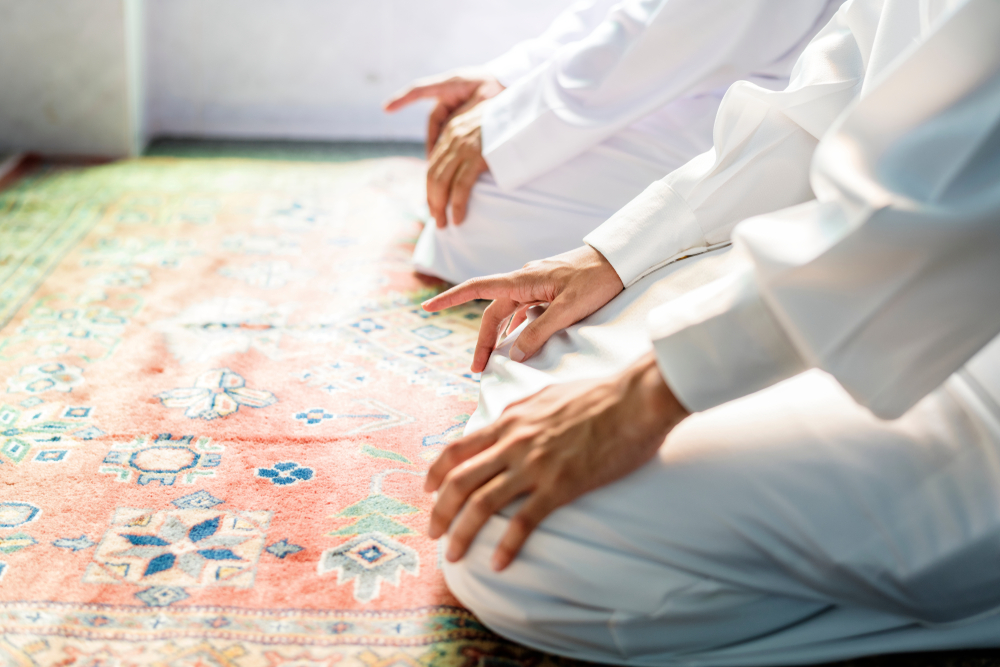Can I Pray Laying Down Due to Sickness and Surgery? If So, How?
Hanafi Fiqh
Answered by Shaykh Yusuf Weltch
Question
Having had surgery and being very ill and in hospital, I have not been able to pray. As I cannot prostrate, can I beg to lie down? If so, could someone explain how, please?
Answer
In the Name of Allah, the Most Merciful and Compassionate
It is permissible for one who is ill such that standing to pray is unduly tricky for them to sit down; if that is still difficult, they are permitted to pray laying down. [Tahtawi/Shurunbulali, Hashiyat Maraqi al-Falah]
Praying While Laying Down
If one is unable to sit while praying, they are permitted to lay down for the prayer in one of two ways:
- Lay flat on their back with their head propped up slightly on a pillow or the like with their face towards the Qibla. In this scenario, it is preferred (if possible) that they raise their knees so as not to point their feet to the Qibla. [Ibid.]
- Lay on their side (preferably the right side; if not, then the left) facing the Qibla. [Ibid.]
Note that the first option is the most preferred in the Hanafi school. [Ibid.]
In both scenarios, they will pray as usual but replace the full bowing with a slight tilt of the head and the prostrations with a lower tilt of the head. They do not raise any pillow or the like towards their forehead to prostrate on. [Ibid.]
Note that the condition is that the bowing of the head for the prostration must be lower than that of the bowing. [Ibid.]
Neither of these head tilts has to be big; a slight nod of the head is sufficient. [Ibid.]
Other Dispensations
If you also find difficulty due to your illness, due to difficulty moving, or due to needing others’ assistance, you are permitted to perform dry ablution (tayammum) instead of wudu). [Ibid.]
Also, if you cannot turn to the Qibla (as described in the two ways above) without the assistance of others, you are permitted to pray in whatever direction is easy for you. You are not required to constantly seek help from others, especially if this causes them difficulty. [Ibn ‘Abidin, Radd al-Muhtar]
The Prayer’s Distinction
Nearly all of the worships of Islam fall off in times of great difficulty, with the exception of prayer. The Messenger of Allah (Allah bless him and give him peace) said, “Pray on the ground (i.e., prostrating on the ground) if you are able. If not, then indicate with (head) gestures, and make your (gestures for the) prostrations lower than (those of) your bowings.” [Bayhaqi]
Furthermore, at the end of His life (may Allah bless him and give him peace), during his final sickness from which he passed, the Messenger of Allah would try multiple times to make the purification because of bouts of fainting to pray. [Amiri’ Bahja al-Mahafil]
He would even take assistance from two of his companions to carry him on their shoulders, such that the Messenger’s feet would drag on the ground, till he reached the Masjid and would pray in congregation. [Ibid.]
Even though performing wudu in such a severe case and praying in the congregation are not obligations upon the sick person, the Prophetic example shows us the importance of prayer and holding on to this blessing from Allah Most High despite the circumstances.
Moving Forward
Take the dispensations above to facilitate your performance of the prayers. You will not be shorted in your reward for those prayers at all. The blessings you will attain through prayer are immense. Allah Most High commands us to use the prayers to seek His assistance, especially in difficult times.
Allah Most High says, “O you who believe, seek help through patience and prayer. Surely, Allah is with those who are patient.” [Quran, 2:153]
Hope this helps
Allah knows best
[Shaykh] Yusuf Weltch
Checked and Approved by Shaykh Faraz Rabbani
Shaykh Yusuf Weltch is a teacher of Arabic, Islamic law, and spirituality. After accepting Islam in 2008, he then completed four years at the Darul Uloom seminary in New York where he studied Arabic and the traditional sciences. He then traveled to Tarim, Yemen, where he stayed for three years studying in Dar Al-Mustafa under some of the greatest scholars of our time, including Habib Umar Bin Hafiz, Habib Kadhim al-Saqqaf, and Shaykh Umar al-Khatib. In Tarim, Shaykh Yusuf completed the memorization of the Qur’an and studied beliefs, legal methodology, hadith methodology, Qur’anic exegesis, Islamic history, and a number of texts on spirituality. He joined the SeekersGuidance faculty in the summer of 2019.
